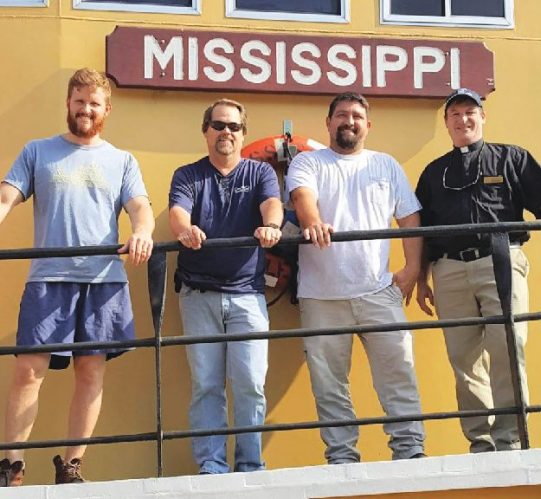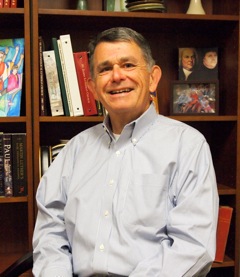by Bill Mintz | Tom Rhoades, a river chaplain with the Seamen’s Church Institute, drives a boat in the Baton Rouge Harbor. Rhoades, a former Methodist pastor transitioning to the ELCA roster, ministers to crews who work on vessels on the Lower Mississippi, Intracoastal Canal and Houston Ship Canal.
Much of the nation’s commerce is transported to markets through a fleet of barges and 5,000 towboats and tugboats traversing the mighty Mississippi and Ohio rivers and the 3,000-mile Intracoastal Waterway.
Yet the public knows little about the men and women—“brown water mariners”—who spend half their lives on the river, separated from their families during 28-day rotations and relying on their crewmates for companionship and to make it through often dangerous situations.
The river is where Tom Rhoades found his call. One of two paid river chaplains with the New York-based Seamen’s Church Institute, Rhoades lives in Baton Rouge, La., and visits the crews of towing vessels and tugs on the Lower Mississippi, Intracoastal Canal and Houston Ship Channel.
Rhoades, a former Methodist pastor who is transitioning to the ELCA roster, has a background that gives him a strong connection with those to whom he ministers: he spent 10 years on the river, first as a deckhand and then as a cook.
“People who work on the river are invisible to the rest of us,” he said. “It’s a hard life—28 days away from their families. Normal pressures are magnified; heart attacks and suicides are more frequent.”

Prior to being called as chaplain, he worked as a deckhand
and cook on riverboats, which helps him connect with the
crews he visits.
The work is demanding and dangerous. “If you make a mistake, it can cost someone their life,” he said. “It’s no small thing to go through two pillars of a bridge. When you go through a lock and dam, you have to break the tow apart. It’s called ‘stopping the cut,’ one man with one rope stops nine barges.”
Rhoades has responded to critical incidents onboard towboats. His training includes critical incident stress management, an intervention technique that he put to work when a mariner committed suicide on Easter Sunday and again when a crew was shaken after recovering the body of a sailor who drowned in Mobile Bay after he went overboard from another vessel.
“When a mariner has his worst day, that’s when we want to be there,” Rhoades said.
Chris Christopher, pastor of Grace Lutheran Church in New Orleans, is working toward becoming an unpaid associate river chaplain after being recruited by Rhoades. He said Rhoades is “completely at home” when he walks onto a boat.
“That’s priceless when it comes to his approachability,” Christopher said. “Sailors know who belongs on their boat, and that enables him to walk into their lives. They know he knows their life.”
Rhoades’ journey to the river began when he concluded he was burned out after nine years as a senior pastor of a rural Arkansas Methodist church. His wife, Stacey, suggested he would probably be a good cook on one of the towboats they saw navigating the Mississippi.
“In 2011, I was the cook on the MV Cooperative Spirit when a guy with a white hard hat with “Chaplain” on it came on board,” Rhoades said. “I didn’t want him to know my background. He introduced himself and asked me if he could bring communion. That started a life-changing relationship that saved my soul.”
That visitor, Kempton Baldridge, an Episcopal chaplain, began a persistent campaign to draw Rhoades out and employ his gifts.
“In 2014, Kempton called and said a mariner had died and asked me, ‘Could you do a funeral?’ ” Rhoades said. “I talked my way into it, and it was a blessing to me. I knew the industry, knew what [the mariner] did, and I could tell his people.”
Baldridge said, “Because of his background on the river, Tom has the ability to speak into the mariners’ experiences with understanding. I marvel at his vulnerability and availability.”
Rhoades has returned to visit the crew that recovered the man overboard and spent five hours with them. “I don’t hop on and off a boat,” he said. “Relationships f low when I tell them that I’m a mariner and we share our stories. Sometimes I get on a boat and cook for them.”
Baldridge said this is part of Rhoades’ ministry: “The table fellowship has allowed needed conversa tions to take place. There was one tough captain who would never make an appointment to visit a chaplain, but he talked to Tom over a meal. It was an unexpected blessing.”
Rhoades said he was drawn to the Lutheran tradition by the liturgy and the tradition of bi-vocational clergy that enables him to be on the river.
“River mariners can’t get off the boat and go to church,” he said. “We don’t build a house; we take the church to the mariner.”
 Bill Mintz, a member of Christ the King Lutheran Church in Houston, has focused much of his service on supporting institutions in the Texas- Louisiana Gulf Coast Synod that will ensure the vitality of the church in the years and decades to come. He was on the founding board of Houston Lutheran Campus Ministry, which called the first ELCA campus pastor at the University of Houston in more than 20 years and also has presence at Rice University and the Texas Medical Center. He also served on the board of Lutherhill Ministries for eight years—a time of expansion of the camp’s core facility in La Grange as well as development of the Zion Retreat Center in Galveston. If you have questions, you can leave a message for Bill Mintz.
Bill Mintz, a member of Christ the King Lutheran Church in Houston, has focused much of his service on supporting institutions in the Texas- Louisiana Gulf Coast Synod that will ensure the vitality of the church in the years and decades to come. He was on the founding board of Houston Lutheran Campus Ministry, which called the first ELCA campus pastor at the University of Houston in more than 20 years and also has presence at Rice University and the Texas Medical Center. He also served on the board of Lutherhill Ministries for eight years—a time of expansion of the camp’s core facility in La Grange as well as development of the Zion Retreat Center in Galveston. If you have questions, you can leave a message for Bill Mintz.